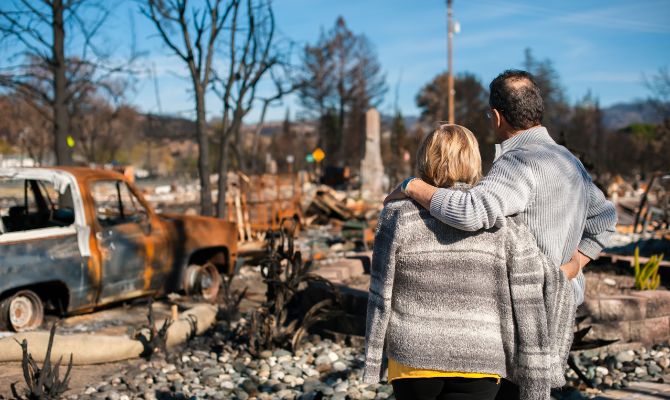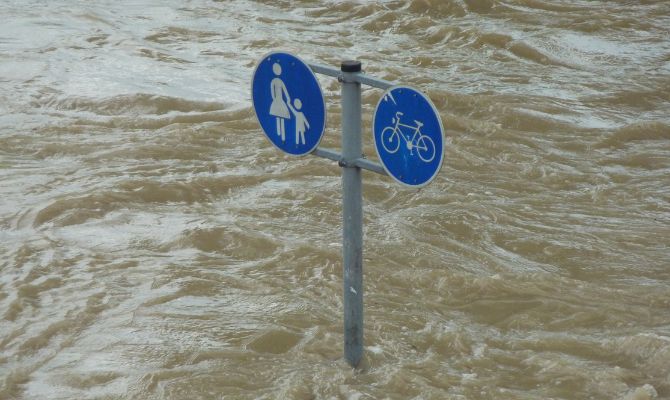Natural Disasters
Emergencies caused by natural forces such as hurricanes, tornadoes, earthquakes, wildfires, and floods.
- Earthquakes: sudden shaking of the ground caused by the shifting of tectonic plates.
- Hurricanes: severe tropical storms with heavy rainfall and strong winds.
- Tornadoes: rotating columns of air that can cause significant damage.
- Wildfires: uncontrollable fires that spread quickly through forests or other wilderness areas.
- Floods: an overflow of water that covers usually dry land.

Medical Emergencies
Situations where a person requires immediate medical attention, such as heart attacks, strokes, severe injuries, allergic reactions, or respiratory distress.
- Cardiac arrest: when the heart suddenly stops beating and blood flow to the brain and other vital organs is cut off.
- Allergic reactions: a severe immune response to a substance that can be life-threatening if not treated quickly.
- Choking: when a person’s airway is blocked, preventing them from breathing.
- Seizures: a sudden, uncontrolled electrical disturbance in the brain that can cause convulsions and loss of consciousness.
- Stroke: when blood flow to the brain is interrupted, causing brain cells to die.

Environmental Emergencies
Emergencies resulting from environmental hazards such as chemical or oil spills, radiation leaks, and hazardous waste incidents.
- Chemical Spills: Accidental release of harmful chemicals into the environment, such as in industrial settings or during transportation.
- Oil Spills: Accidental or intentional release of oil or petroleum products into bodies of water or onto land.
- Radiation Leaks: Unintended release of radioactive material into the environment, which can pose significant health and safety risks.
- Hazardous Waste Incidents: Accidental release or mishandling of hazardous waste materials, which can lead to environmental contamination and health risks.

Cybersecurity Emergencies
Emergencies caused by cyberattacks, data breaches, and other digital threats to individuals, businesses, and critical infrastructure.
- Transportation Accidents: Emergencies that occur on highways, railways, or aviation, such as car accidents, train derailments, or plane crashes.
- Car Accidents: These emergencies can range from minor fender benders to serious collisions resulting in injury or death. They can occur due to driver error, poor road conditions, or mechanical failures.
- Train Derailments: Train derailments occur when a train goes off its tracks. This can happen due to mechanical failure, poor track conditions, or operator error. Derailments can result in injuries, deaths, and environmental damage if hazardous materials are involved.
- Plane Crashes: These are emergencies that occur when a plane crashes or has to make an emergency landing. They can be caused by mechanical failure, pilot error, or severe weather conditions. Plane crashes can result in injuries, deaths, and extensive property damage.
- Boat Accidents: Boat accidents can occur due to mechanical failure, operator error, or adverse weather conditions. These emergencies can range from minor incidents to serious accidents that result in injury or death.
- Bus Accidents: Bus accidents can occur due to driver error, mechanical failure, or poor road conditions. They can range from minor accidents to serious crashes that result in injury or death.
- Pipeline Accidents: These emergencies can occur due to pipeline corrosion, operator error, or natural disasters. They can result in oil or gas leaks, fires, or explosions, and can cause environmental damage and injury or death to people or animals in the vicinity.

Public Health Emergencies
Emergencies that involve widespread outbreaks of infectious diseases, pandemics, or bioterrorism.
- Pandemics։ widespread outbreaks of infectious diseases that affect large numbers of people across multiple countries or continents, such as the COVID-19 pandemic.
- Epidemics։ outbreaks of infectious diseases that affect a significant number of people in a localized area, such as the 2014 Ebola outbreak in West Africa.
- Bioterrorism։ the deliberate release of harmful biological agents or toxins with the intent to harm or terrorize people, such as the 2001 anthrax attacks in the United States.
- Foodborne illness outbreaks։ outbreaks of illness caused by consuming contaminated food or drink, such as the 2011 E. coli outbreak in Germany.
- Environmental health emergencies։ emergencies resulting from exposure to hazardous substances or conditions in the environment, such as air pollution or contaminated water sources.
- Biological accidents։ accidents or incidents in laboratories or other settings that result in the accidental release or exposure to dangerous biological agents or toxins.
- Chemical spills or releases։ releases of hazardous chemicals or materials into the environment that can cause harm to human health, such as the 1984 Bhopal gas tragedy in India.
- Radiation emergencies։ emergencies resulting from exposure to ionizing radiation, such as nuclear accidents or incidents involving the transport of radioactive materials.

Workplace Emergencies
Emergencies that happen in the workplace, such as fires, explosions, chemical spills, and workplace violence incidents.
- Fires: Emergencies caused by fires that break out in the workplace due to various reasons, including electrical faults or chemical spills.
- Explosions: Emergencies resulting from explosions in the workplace due to gas leaks or combustible materials.
- Chemical Spills: Emergencies caused by the release of hazardous chemicals in the workplace, posing a risk to employees’ health and safety.
- Workplace Violence: Emergencies resulting from violent incidents in the workplace, including physical or verbal abuse, threats, or harassment.

Civil Unrest
Emergencies that arise due to social or political unrest, including protests, riots, and civil disturbances.
- Protests: Emergencies that arise from peaceful protests that turn violent, leading to injuries and property damage.
- Riots: Emergencies resulting from large-scale violent unrest, including looting, arson, and physical attacks.
- Civil Disturbances: Emergencies that arise from civil disturbances, including strikes, marches, and demonstrations that disrupt public order and safety.

Animal Attacks
Emergencies that occur when a person is attacked by a wild or domesticated animal, such as a dog or a bear.
- Domestic Animal Attacks: Emergencies resulting from attacks by domesticated animals such as dogs, cats, and horses.
- Wild Animal Attacks: Emergencies resulting from attacks by wild animals such as bears, snakes, or sharks.

Power Outages
Emergencies that result from power outages due to extreme weather or infrastructure damage.
- Weather-Related Emergencies: Emergencies that arise due to extreme weather conditions such as hurricanes, tornadoes, or blizzards, causing power outages.
- Infrastructure Damage: Emergencies resulting from infrastructure damage caused by natural disasters, accidents, or human-made events.

Terrorist Attacks
Emergencies caused by violent attacks on civilians, infrastructure, or government institutions, such as bombings or mass shootings.
- Bombings: Emergencies resulting from violent attacks using explosive devices, causing widespread damage and casualties.
- Mass Shootings: Emergencies resulting from violent attacks using firearms, causing multiple fatalities and injuries.
- Cyberattacks: Emergencies resulting from cyber-attacks that disrupt critical infrastructure, including power grids, transportation systems, and communication networks.

Water Emergencies
Emergencies related to water supply or quality, such as droughts, floods, or water contamination.
- Droughts: Emergencies that arise from prolonged periods of dry weather that can cause water shortages and affect agriculture and other industries.
- Floods: Emergencies caused by heavy rainfall, storms, or other natural disasters that lead to flooding and damage to homes and infrastructure.
- Water Contamination: Emergencies resulting from water supply contamination, including chemical spills, sewage overflows, or bacterial outbreaks.


